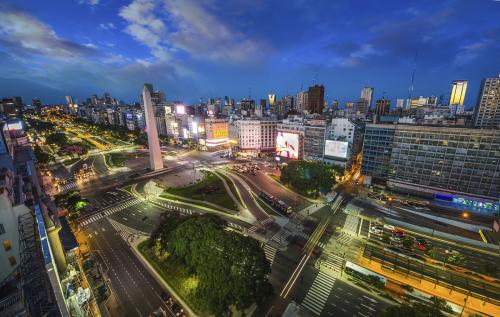This is the second blog in a two-part series on the city network Urban 20 (U-20). The first article introduced the U-20. This article examines the U-20 final communiqué and its relationship to the G-20 proceedings, and draws pathways for evolution.
Just three years from its official launch, the Urban 20 (U-20) is becoming a promising platform to elevate an urban perspective within the deliberation of the G-20, one of the world’s key forums for global policymaking. The U-20 works alongside other “engagement groups,” such as the Women 20, the Think Tank 20, and the Youth 20 to enrich the G-20 decisionmaking process. Among these G-20 affiliates, the U-20 is the only one comprised of elected officials, which offers them unique political legitimacy and leadership, especially when combined with the aggregate economic power of their metropolitan areas.
The U-20 has emerged from a dense landscape of city-focused networks that often promote and support a brand of localism that advocates for cities as autonomous global actors. In contrast to the “celebratory localism” that risks ignoring the power of national and global institutions to set the context for local policies, the Urban 20 offers a concrete opportunity to influence a global policymaking body that establishes global and national norms and standards that matter for local action.
As we described in an introductory article, the process of the U-20 mirrors the G-20 proceedings. Sherpas draft an outcome document that is informed by task forces and ultimately agreed at a mayoral summit, then transmitted to G-20 leaders. Throughout the process, city leaders seek opportunities to connect with high-level G-20 representatives to share perspectives and findings related to G-20 deliberations. At the same time, the U-20’s influence over the proceedings, priorities, and outcomes of the G-20 has been unclear to now.
The U-20 calls for better cooperation between local and national governments.
The rhetoric of city diplomacy and global cooperation among cities is one of pragmatism and problem-solving. Early in the U-20 process, the participating cities select a set of common challenges on which to focus and lift up as key urban development priorities. Last year’s themes were “Circular Carbon-Neutral Economy,” “Inclusive Prosperous Communities,” and “Nature-Based Urban Solutions.” By elevating these to the G-20, the cities aim to establish common ground for local-national cooperation by G-20 countries: Like previous communiqués, this year’s “call(s) on the G-20 to work with local governments” on a series of reforms and initiatives.
To achieve this, the U-20 seeks to maximize its unique value: a direct connection to the G-20 proceedings. Last year, the U-20 chair addressed the Extraordinary Virtual G-20 Leaders’ Summit. The U-20 was also represented in two key G-20 meetings: the Extraordinary G-20 Digital Economy Ministerial meeting in March 2020, and the third G-20 Sherpa meeting. The U-20 also provided inputs to various G-20 task forces and working groups, including on tourism, digital economy, and development.
We examined both the U-20 and G-20 communiqués and identified where the major themes echoed each other. They share a central—and obvious—core theme: the need for a recovery from the COVID-19 crisis that works towards equity and sustainability. The G-20 communiqué also reflected recommendations included in the U-20 communiqué, such as similar language promoting the circular economy, gender equality, and food security.
While key topics resonate between the two processes, the G-20 seems to remain mostly impervious to the U-20 call for a better partnership. We analyzed the number of mentions of local action and the inclusion of city leadership in G-20 communiqués. These are rare. Even after all this year’s interactions between the two processes, the 2020 G-20 communiqué doesn’t mention local efforts.
The April 2020 G-20 communiqué that followed the extraordinary G-20 Leaders’ Summit in response to the COVID-19 pandemic mentions local action only once, despite the heroic efforts of local governments on the front lines of the pandemic. The G-20 2019 Tokyo communiqué alludes to the importance of city networking to accelerate the diffusion of innovation around smart cities. The G-20 2018 Argentina communiqué does not appear to mention cities or local action, despite what was a close personal and political relationship between Argentina’s president and the mayor of Buenos Aires at the time.
Many issues tackled by the G-20 are primarily the domain of nation-states. In 2020, for instance, G-20 finance ministers and central bank governors agreed on the Debt Service Suspension Initiative (DSSI) given the economic fallout from COVID-19. At the second July G-20 Sherpas meeting, countries discussed policy coordination among the G-20 countries on international trade. However, while these issues are not reflected in U-20 communiqués, they are highly relevant to cities, which are the primary economic drivers of national economies. In its current form and approach, the U-20 seems to struggle to meet its core objective of bringing “urban issues to the forefront of the G20 agenda.”
Recommendations
Still nascent, the U-20 might grow its influence by reexamining some aspects of its process. The Milan and Roma co-presidency of the U-20 in 2021 provides a unique opportunity to explore improvements—possibly in a dedicated task force on “Strengthening the U-20”—and develop solutions that speak directly to the decisions facing the G-20. Our recommendations include:
Clarifying the objectives of the U-20. The U-20 has grown into a forum of influential mayors that demonstrates how major cities see local priorities. That “next-level down perspective,” an urban collective that mirrors the economic muscle of the G-20, signals the direction of priorities on the global stage for cities. This process has also uncovered political disagreements and provides a space for an honest and authentic exchange on tough issues, such as this year’s spotlight on human rights, as some mayors withdrew due to concerns about the murder of journalist Jamal Khashoggi and the detention by Saudi Arabia of women’s rights activist Loujain al-Hathloul.
The comparative advantage of the U-20, however, is its connection to the G-20. This is its unique opportunity—to be an influential and even essential partner to a key multilateral forum. Its members should explicitly clarify and reaffirm that mandate.
Clarifying membership to ensure continuity and balance representation. U-20 membership does not yet rely upon clear guidelines and criteria. Currently, the host city decides which cities to invite from the G-20 countries. As a result, city participation can vary from year to year. The U-20 might create guiding principles for membership and seek to ensure a stable core group of cities, building relationships and commitment over time and across political cycles, balanced by participation from new, dynamic cities.
As an influencer for global norms and standards, the U-20 should also include the voices of non-G-20 cities, maintaining and expanding invitations for observer cities. Inviting additional representation from rapidly growing cities in the Global South will strengthen and broaden the relevance of the U-20, as major global cities in the South will host the next iterations (Jakarta, Indonesia in 2022; New Delhi, India in 2023; and Sao Paulo, Rio de Janeiro, or Brasilia, Brazil in 2024).
A light secretariat may be useful to maintain institutional consistency over annual editions and strengthen U-20 links to the G-20’s major themes and considerations. The T-20 (the G-20 think-tank engagement group) offers one model, relying upon a neutral third party; each T-20 host decides the extent to which to take advantage of its support. Any U-20 secretariat should be diplomatically savvy and have good relationships with nation-state diplomats and the networks that drive the G-20, to provide guidance and intelligence on the priorities preoccupying G-20 Sherpas and finance ministers. A secretariat with the right diplomatic skills would be helpful in identifying the high-value entry points for the U-20 to provide inputs into G-20 deliberations.
Shifting from supplicants to partners in problem-solving. The U-20 is spending the bulk of its time focused on developing and agreeing upon city-specific priorities to insert into the priorities of the G-20. In essence, the communiqué delivered to the G-20 president and heads of state represents a series of “asks.” The U-20 might benefit from and increase its influence by building a more dynamic discourse with the G-20 working groups and tracks, engaging directly on the key issues and trade-offs that define the priorities of the G-20.
Indeed, the G-20 is a forum for its members to take collective action. Asking its members to take notice of the imperatives at the local level of government is a message that is often more about respective national-subnational relations. The U-20 might be more influential by showing how its own collective action—whether part of the U-20 proceedings or imported from other city forums where commitments are being made—could complement or improve the collective agreements that G-20 members are undertaking, or address possible spillover effects of G-20 norms and commitments affecting urban governance. Though challenging, the U-20 process could seek to involve G-20 representatives more directly in joint problem-solving. It could also showcase local innovations or specific challenges within cities that could help advance G-20 priorities.
Indeed, we recommend a slight shift in emphasis regarding the U-20’s mandate—that its mission is to strengthen the impact of the G-20, acting as an influential interlocuter and essential partner on the ground, helping it integrate the growing global importance of cities in collective action. Putting the emphasis on the G-20’s impact may enable a beneficial shift in the U-20’s approach and how it deploys its collective political capital.
Leveraging the collective leadership of cities in implementing global agendas prioritized by the G-20. Along these lines, U-20 cities are involved in different collective undertakings relevant to key G-20 development priorities. They could be excellent partners, for example, on pandemic preparedness and global health security. They have defined a major agenda on a green and just recovery, where their combined actions might fit well with G-20 aspirations for the economic recovery from COVID. An increasing number of cities have elevated their leadership on the Sustainable Development Goals (SDGs) through their innovations and commitments at the local level, and are even reporting their progress through Voluntary Local Reviews (VLRs). Given the G-20’s focus on the SDGs since the Hangzhou G-20 Action Plan on the 2030 Agenda for Sustainable Development, the U-20 could accelerate the adoption of the SDGs as a local policy and reporting framework, demonstrating their collective impact on global progress—and establishing their legitimacy as they seek to partner with the G-20 on its priorities.
Focusing the group’s value and branding on financing. Operating in a crowded space of city networks, the U-20 should avoid duplicating efforts with other city networks by leaning on the G-20’s distinctive role in financial coordination. As the recovery from the COVID-19 crisis poses financial challenges, cities are seeking increased access to development finance, new investment mechanisms, and direct relief funding. Reflecting the G-20 exploration of coordinated financial actions to the economic fallout from COVID-19, the U-20 launched a COVID-19 Recovery and Resilience Special Working Group, co-chaired by Rome, Buenos Aires, and New York City. The working group released a compelling report on “Financing Cities’ Recovery from Covid-19 & Preparing for Future Shocks,” leading to the launch of a Global Urban Resilience Fund to increase cities’ access to international finance. The working group’s focus on financing efforts for the long-term resilience of societies positions it as an appealing interlocutor to G-20 leaders. The U-20 might consider institutionalizing its efforts to create a formal link over time with the G-20 Finance Track.
Leveraging partners within the G-20 to advance and elevate an urban perspective. The World Bank Group, the European Union, and the OECD have developed urban frameworks and sought to build closer partnerships with local governments. These institutions also weigh heavily in G-20 negotiations and agenda-setting. Cities of the U-20 should leverage their support as relays of an urban agenda in the G-20. For instance, the OCED often acts as strategic adviser to the G-20 and has also promoted a territorial approach to the SDGs. Cities could leverage connections with the OECD Centre for Entrepreneurship, SMEs, Regions and Cities to elevate urban issues within the G-20 track.
Conclusion
The 75th anniversary of the United Nations kicked off a debate over the future of multilateralism and 21st century diplomacy. As cities demonstrate their front-line role on many global challenges, raising their collective voice matters more than ever. Yet rather than rest on celebratory declarations like “while countries talk, mayors act,” cities must continue to explore tangible channels where their cooperation can elevate the multilateral decisionmaking platforms of nation-states.
The U-20 creates an opportunity for cities to demonstrate their leadership by making concrete commitments for action and teaming up with the G-20 on the problems it is seeking to solve. The 2021 presidency of the G-20, and the co-presidency of Milan and Rome of the U-20, represent an opportunity for closer partnership between the U-20 and the G-20. The Sherpas process also will aim to influence the COP26 and G-7 in the United Kingdom. Cities have an urgent opportunity to leverage the unique political momentum of 2021 and the leadership of these particular host cities. It is time for the U-20 to take a significant step forward.





Commentary
The Urban 20 (U-20): Pathways to maximizing its partnership with the G-20
January 28, 2021